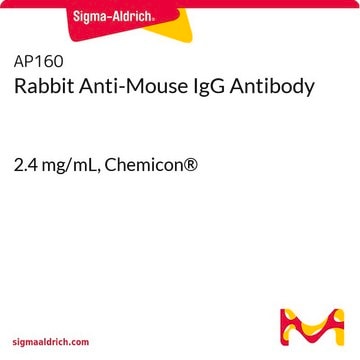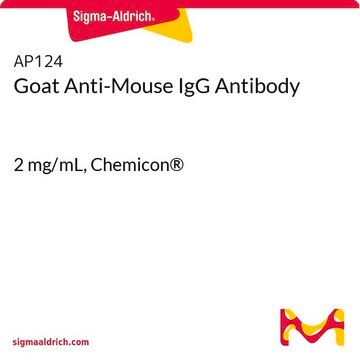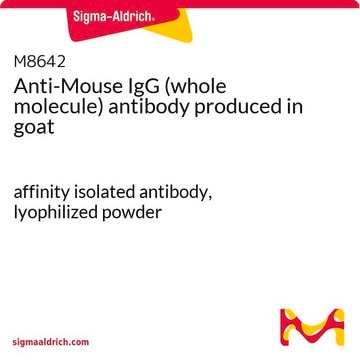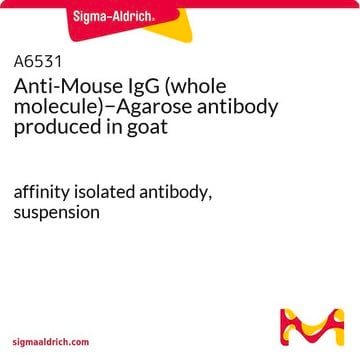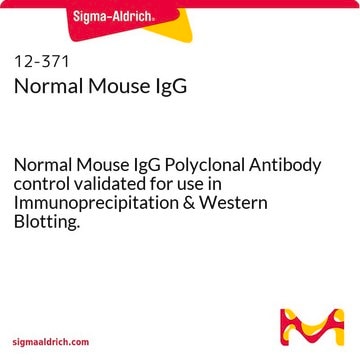06-371
Rabbit Anti-Mouse IgG Antibody
Upstate®, from rabbit
Sign Into View Organizational & Contract Pricing
All Photos(1)
About This Item
UNSPSC Code:
12352203
eCl@ss:
32160702
NACRES:
NA.46
Recommended Products
biological source
rabbit
Quality Level
antibody form
purified immunoglobulin
antibody product type
secondary antibodies
clone
polyclonal
species reactivity
mouse
manufacturer/tradename
Upstate®
technique(s)
immunoprecipitation (IP): suitable
isotype
IgG
shipped in
dry ice
target post-translational modification
unmodified
Related Categories
Specificity
mouse IgG
Immunogen
Highly purified whole mouse IgG (heavy and light chains)
Application
Rabbit anti-Mouse IgG Antibody detects level of Mouse IgG & has been published & validated for use in IP.
Research Category
Secondary & Control Antibodies
Secondary & Control Antibodies
Research Sub Category
Whole Immunoglobulin Secondary Antibodies
Whole Immunoglobulin Secondary Antibodies
Quality
routinely evaluated by immunoprecipitating mouse IgG then blotting with anti-Fak (Catalog #05-182)
Target description
50-60kDa
Physical form
Format: Purified
Protein A chromatography
of 0.02M Potassium Phosphate, pH 7.2, 0.15M NaCl, with 0.01% sodium azide
Storage and Stability
2 years at -20°C
Analysis Note
Control
Positive Antigen Control: Catalog #12-305, 3T3/A31 lysate. Add 2.5 μL of 2-mercapto-ethanol/100 μL of lysate and boil for 5 minutes to reduce the preparation. Load 20 μg of reduced lysate per lane for minigels.
Positive Antigen Control: Catalog #12-305, 3T3/A31 lysate. Add 2.5 μL of 2-mercapto-ethanol/100 μL of lysate and boil for 5 minutes to reduce the preparation. Load 20 μg of reduced lysate per lane for minigels.
Legal Information
UPSTATE is a registered trademark of Merck KGaA, Darmstadt, Germany
Disclaimer
Unless otherwise stated in our catalog or other company documentation accompanying the product(s), our products are intended for research use only and are not to be used for any other purpose, which includes but is not limited to, unauthorized commercial uses, in vitro diagnostic uses, ex vivo or in vivo therapeutic uses or any type of consumption or application to humans or animals.
Not finding the right product?
Try our Product Selector Tool.
Storage Class Code
12 - Non Combustible Liquids
WGK
WGK 2
Flash Point(F)
Not applicable
Flash Point(C)
Not applicable
Certificates of Analysis (COA)
Search for Certificates of Analysis (COA) by entering the products Lot/Batch Number. Lot and Batch Numbers can be found on a product’s label following the words ‘Lot’ or ‘Batch’.
Already Own This Product?
Find documentation for the products that you have recently purchased in the Document Library.
M Yamamoto et al.
The Journal of biological chemistry, 272(19), 12492-12494 (1997-05-09)
The DF3/MUC1 mucin-like glycoprotein is aberrantly overexpressed in human breast carcinomas. The functional role of DF3 is unknown. The present studies demonstrate that DF3 associates with beta-catenin. Similar findings have been obtained for gamma-catenin but not alpha-catenin. DF3, like E-cadherin
Differential transcription factor use by the KIR2DL4 promoter under constitutive and IL-2/15-treated conditions.
Presnell, SR; Zhang, L; Chlebowy, CN; Al-Attar, A; Lutz, CT
Journal of immunology (Baltimore, Md. : 1950) null
Peter S Burrage et al.
Arthritis and rheumatism, 56(3), 892-904 (2007-03-01)
To evaluate the effects of LG100268 (LG268), a synthetic ligand for the nuclear hormone receptor retinoid X receptor, on the expression of matrix metalloproteinase 1 (MMP-1) and MMP-13 induced by proinflammatory cytokines in a chondrocyte model. SW-1353 human chondrosarcoma cells
Zhong Peng et al.
Function (Oxford, England), 2(2), zqab007-zqab007 (2022-03-26)
Hydrogen sulfide (H2S) emerged recently as a new gasotransmitter and was shown to exert cellular effects by interacting with proteins, among them many ion channels. Acid-sensing ion channels (ASICs) are neuronal voltage-insensitive Na+ channels activated by extracellular protons. ASICs are
M Pap et al.
The Journal of biological chemistry, 273(32), 19929-19932 (1998-08-01)
Growth factor-dependent survival of a variety of mammalian cells is dependent on the activation of phosphatidylinositol (PI) 3-kinase and its downstream effector, the protein kinase Akt. Glycogen synthase kinase-3 (GSK-3) has been previously identified as a physiological target of Akt
Our team of scientists has experience in all areas of research including Life Science, Material Science, Chemical Synthesis, Chromatography, Analytical and many others.
Contact Technical Service